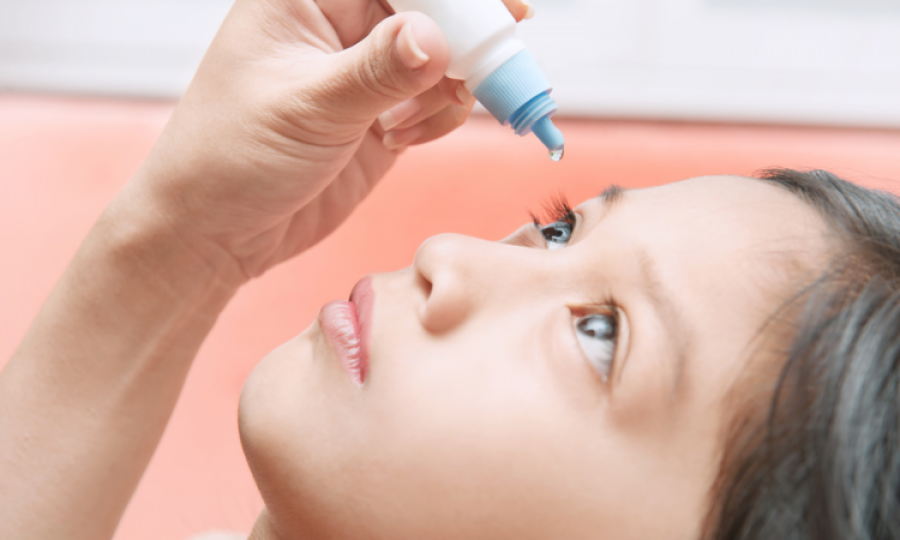Atropine eye drops, less screen time may avert child myopia

HONG KONG: Growing cases of myopia or nearsightedness among the children aged 4-9 years may be prevented or treated using atropine eye drops nightly, suggests a research, advising the parents to cut screen time of their kids and ensure they remain outdoors for at least two hours to avoid long-term damage to their eyesight.
Researchers in Hong Kong report that nightly use of an atropine eye drop resulted in a significantly lower chance of developing myopia among the children in the said age group after two years.
While more research will be needed to confirm and replicate the findings, the study’s lead author terms the data promising, suggesting it could nip vision problems in the bud before they become a more serious issue later in life.
Nearsightedness is common, while myopia is generally simple to address — usually with corrective lenses or laser surgery — and not as serious as other eye problems — it’s still widespread.
Myopia has been classified as a refractive error -- a category representing the most frequent eye problems in the United States – by the US Centers for Disease Control and Prevention (CDC).
Because vision degrades with age, the data from Hong Kong suggests that use of eye drops early in life could be a way to prevent bigger problems down the line.
“Early onset [of] myopia is associated with high myopia later in life and it’s irreversible,” warns Dr Jason Yam, the lead study author and associate professor of ophthalmology at the Chinese University of Hong Kong. “Therefore, delay in myopia onset can decrease the risk of high myopia and future complications.
Our study established the most effective method to delay myopia onset.”
The research, funded by government and different charities, found that eye drops containing 0.05 percent atropine gave the best results. The difference between these eye drops and those containing either a placebo or 0.05pc atropine was statistically significant.
Yam says that he and his colleagues are continuing to follow up with participants in the study to evaluate longer-term effects.
Atropine has been prescribed by optometrist for years to treat child myopia.
Laura Vasilakos, a fellow in the College of Optometrists in Vision Development, says she and other optometrists routinely prescribe low-dose atropine eye drops for children with myopia.
Another optometrist, Dana Spearin, agrees, saying: “All of my patients who are on 0.05pc atropine have not had an abnormal myopic or nearsighted increase over a 2-year period.”
“Since the 1970s, the incidence of myopia has nearly doubled, rising from 25 percent of the US population to 42pc, but predicted to increase to over 50 percent in the next 20 years,” warns Vasilakos. “Once a child becomes myopic, their vision deteriorates every 6 to 12 months, requiring a stronger and stronger prescription,” she says.
She observes that in most young adults, myopia will eventually stabilize, but the initial progression of the condition, where the eyes stretch and grow too much, can lead to bigger eye problems later in life, such as a myopic macular degeneration, retinal detachment, glaucoma, and cataracts.
“The higher the myopia, the greater the risk,” she warns. “Since myopia progresses the fastest in children under age 10, the most important opportunity to slow eye growth is when children are young.”
However, there’s a range of treatment options available, from the atropine drops, to specialised contact lenses to orthokeratology, or ortho-k — contact lenses that act like a retainer to shape the eye and improve vision.
To take care of eye health on a daily basis, Vasilakos recommends limiting screen time for children.
“Follow the 20-20-20+2 rule: for every 20 minutes of screen time, take a 20-second break, look at something 20 feet away or more, and spend at least 2 hours outside each day, throughout the day,”says Vasilakos.
“The World Health Organization recommends no more than two hours of recreational screen time per day for children aged 5 to 17 years, and a limit of 1 hour per day for preschool-aged children.”
Trending
Popular
Revolutionary HIV drug can drastically cut treatment costs
-
AI model to improve EEG reading for ICU ...
04:00 PM, 5 Jun, 2024 -
Study links weight-neutral eating ...
04:00 PM, 11 May, 2024 -
Researchers strive to expand telehealth ...
04:00 PM, 11 May, 2024 -
UCFS clinical trial to test efficacy of ...
03:11 PM, 23 Apr, 2024




